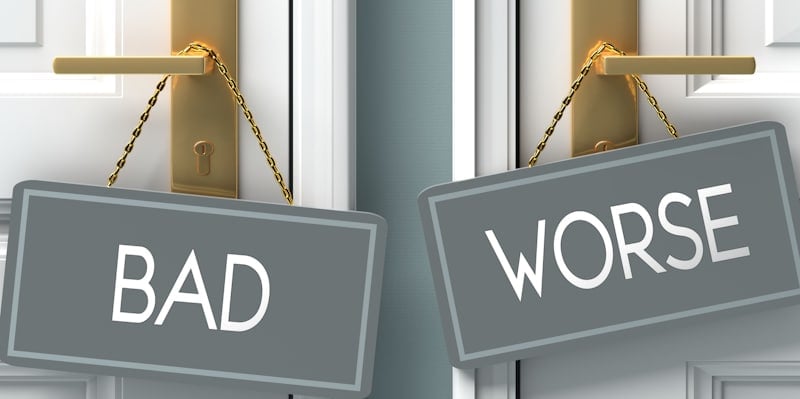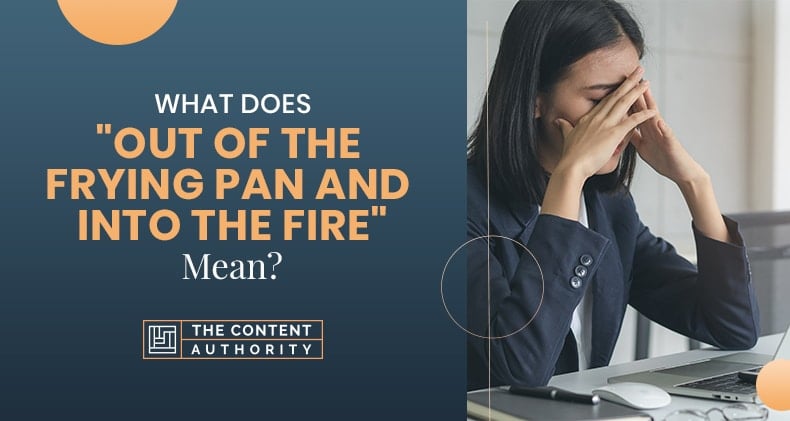There are many things that we say in the English language today that might not make sense to someone from another culture. These are what are known as proverbs and they’ve been passed down through many generations. Taking the time to learn their meaning can enhance your use of the language.
When someone uses the proverb “Out of the frying pan and into the fire” they’re trying to tell you that someone has managed to get themselves out of a bad situation only to find themselves in a worse situation. This is a phrase that dates back to 1528.
Meaning of the Proverb
The phrase “out of the frying pan and into the fire” is sometimes taken incorrectly to mean that you leave the frying pan to enter the fire. In other words, they think that you’re leaving one bad situation or person and going to another bad situation or person without there being any type of an improvement in the situation or person. Sometimes the situation or person may even be worse. However, this isn’t what this phrase actually means.
The phrase “out of the frying pan and into the fire” actually means leaving one bad situation or person behind. In other words, the person or the situation isn’t equivalent. The second situation or person is definitely worse than the first situation or person. This makes sense when you stop to think about how it’d be worse to be tossed into a fireplace than it is to be stuck in a frying pan.
Here you actually have a very clever way of saying that someone or something is getting worse. Whether you’ve made the situation worse yourself or it’s just a matter of circumstances, you’d have been better off if you’d stuck with the first unpleasant situation or person.
There are a few other ways in which you can say that you’ve gone from a bad situation to a worse one; that a bad situation has turned critical; or that you’re moving from a very difficult position to one that is considered much worse. These other phrases include:
- “That ship has sailed.”
- “There are clouds on the horizon.“
- “Through thick and thin.”
- “Shape up or ship out.”
- “Run like the wind.”
- “From bad to worse.”

Origins of the Proverb
The first time we know of the saying “out of the frying pan and into the fire” being used was around 1528. This is when Sir Thomas More published “A Dialogue Concerning Heresies.” With this proverb, he used imagery in a straightforward fashion. It was his way of saying that slowly burning in a frying pan isn’t as bad as if you were burning quickly in the fire. This meant that when you’d jump out of the frying pan you were able to avoid dealing with a bad fate but when you drop into the fire you find yourself dealing with a worse fate.
The phrase is also found in many other places throughout history as well including:
- In early Greek poetry, it was used in describing the process of trying to escape smoke only to find yourself being scorched by the flames instead.
- Poet Caesar Germanicus used the phrase to describe a hare’s fate. He got devoured by a sea dog because he jumped into the sea in an attempt to run away from a canine.
- There’s a Latin seafarer’s tale where a character was attempting to avoid Charybdis only to run onto Scylla.
- The collection of Aesop’s Fables includes this phrase in “The Stag and the Lion.” Here someone urged his mates to save themselves by jumping into the water. Unfortunately, when they did they landed on burning coals.
As you can see, this proverb can be found in many different languages. It dates as far back as ancient Greece.

Understanding Idioms and Proverbs
Idioms and proverbs are expressions whose meaning you won’t be able to truly understand simply based on the words that it uses. This is because it has a figurative (not a literal) meaning. In other words, “out of the frying pan and into the fire” doesn’t mean what it appears to mean. Of course, this is just one of the many examples of this type of expression. Some of the others include:
- “You’re in hot water” may make you think of someone who’s standing in hot water but it actually means you’re in trouble.
- “His boss gave him the ax” may make you think his boss wants him to cut down a tree but it actually means he was fired from his job.
- “It’s time to face the music” may make you think that you need to listen to some music but it actually means that it’s time to face your actions’ consequences.
- “You’ve hit the nail on the head” may make you think that of someone pounding nails on a construction site but it actually means that you’ve done something exactly right.
Of course, you also know that “out of the frying pan and into the fire” doesn’t mean that someone is literally jumping out of the frying pan into the fire. Instead, it’s frequently used figuratively to mean that you’re moving from a bad situation into a worse one. When this idiom is used they’re telling you that things have just gotten worse for them.
In this way, a proverb is a short common phrase that’s used to impart some wisdom or advice. Sometimes it’s also used to share a universal truth. This is why it may be referred to as an adage (a short statement that shares a universal truth).

Using This Proverb
Every proverb has a moral that’s being implied through it. For instance, when someone tells you they’ve jumped “out of the frying pan and into the fire” they’re telling you that while attempting to avoid or escape from a bad situation that they found themselves in they made a rash decision. This resulted in them doing something that landed them in a much worse situation.
There are a lot of different circumstances in which you could use this proverb. For instance, maybe there’s a person who’s decided that they’re going to resign from their job. They’re doing so because they believe that their boss is treating them unfairly. Their mind is already set on taking another job offer. Unfortunately, they end up not getting the job after all and so they find themselves unemployed and struggling to make ends meet. It would be completely acceptable in this situation to say that they’ve jumped “out of the frying pan and into the fire.”
Another example of when it’d be appropriate to use this proverb is if there’s a woman who decides to get a divorce because she feels her husband isn’t providing well for her. In doing so she decides to marry a man who thinks will provide for her better. Unfortunately, she discovers that the new man she marries is a lazy man who wants to sponge on her. This woman has moved “out of the frying pan and into the fire.”
Example Sentences
Now that you have a better understanding of the concept this proverb is trying to portray and how to properly use it, you may want to try using it yourself. Here are a few sentences to help you get started:
- Since she wanted her independence so badly she agreed to get married early. Unfortunately, she unknowingly jumped out of the frying pan into the fire.
- When I moved from my old school to this one it was like jumping out of the frying pan into the fire.
- It’s like leaving the frying pan and entering the fire.
- That would be like jumping out of the frying pan into the fire.
- Although I wanted to fix the leak the pipe was so old I knew it’d be a matter of moving from the frying pan into the fire.
- When I tried to apologize to Lisa she started yelling at me. I felt like I was moving out of the frying pan into the fire.
- This is unbelievable! I’ve moved from the frying pan into the fire.
- If you watched the news you’d see we moved from the frying pan into the fire.
- My number one priority is to make sure this works so I don’t step out of the frying pan into the fire.
- If I can avoid the fire, I’ll be happy to continue struggling in the frying pan.
Conclusion
Proverbs have been passed down through many generations of the English language being used. These are a great way to enhance your use of the language once you know what they mean. For instance, a phrase that dates back to 1528 is “out of the frying pan and into the fire.” It is used frequently to mean that someone has managed to get themselves out of a bad situation only to get themselves into a worse one. Hopefully, now that you have a better understanding of it you’ll be able to use it in your conversations.
Shawn Manaher is the founder and CEO of The Content Authority. He’s one part content manager, one part writing ninja organizer, and two parts leader of top content creators. You don’t even want to know what he calls pancakes.

